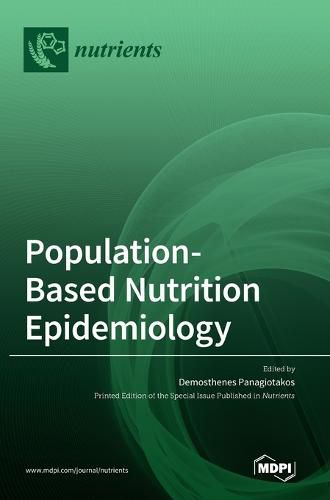Readings Newsletter
Become a Readings Member to make your shopping experience even easier.
Sign in or sign up for free!
You’re not far away from qualifying for FREE standard shipping within Australia
You’ve qualified for FREE standard shipping within Australia
The cart is loading…






This title is printed to order. This book may have been self-published. If so, we cannot guarantee the quality of the content. In the main most books will have gone through the editing process however some may not. We therefore suggest that you be aware of this before ordering this book. If in doubt check either the author or publisher’s details as we are unable to accept any returns unless they are faulty. Please contact us if you have any questions.
Nutritional epidemiology examines dietary or nutritional factors in relation to the occurrence of disease in various populations. It is a fact that substantial progress has been made in recent years in nutritional epidemiology. Compared to the practice during the 1990s, and with the improvements in data analytics, several new approaches are gaining ground. Results from a variety of large-scale studies in the field of nutrition epidemiology have substantially contributed toward the evidence used in guiding dietary recommendations for the prevention of cardiovascular diseases, metabolic disorders, some types of cancer, and other morbidities. In this Special Issue, we would like to bring readers closer to the state-of-the-art in the field by gathering papers covering different aspects of nutrition epidemiology from population-based observational studies. Topics of the submitted articles may, but not necessarily, include eating habits of various populations, especially of those not well-studied, such as in Africa, Oceania, South Americas, immigrants, minorities, as well as a variety of associations between nutrients/foods/food patterns and chronic diseases, like cardiovascular, diabetes, obesity, cancer, etc., and gene-nutrient and epigenome-nutrient interactions related to human health at all ages.
$9.00 standard shipping within Australia
FREE standard shipping within Australia for orders over $100.00
Express & International shipping calculated at checkout
This title is printed to order. This book may have been self-published. If so, we cannot guarantee the quality of the content. In the main most books will have gone through the editing process however some may not. We therefore suggest that you be aware of this before ordering this book. If in doubt check either the author or publisher’s details as we are unable to accept any returns unless they are faulty. Please contact us if you have any questions.
Nutritional epidemiology examines dietary or nutritional factors in relation to the occurrence of disease in various populations. It is a fact that substantial progress has been made in recent years in nutritional epidemiology. Compared to the practice during the 1990s, and with the improvements in data analytics, several new approaches are gaining ground. Results from a variety of large-scale studies in the field of nutrition epidemiology have substantially contributed toward the evidence used in guiding dietary recommendations for the prevention of cardiovascular diseases, metabolic disorders, some types of cancer, and other morbidities. In this Special Issue, we would like to bring readers closer to the state-of-the-art in the field by gathering papers covering different aspects of nutrition epidemiology from population-based observational studies. Topics of the submitted articles may, but not necessarily, include eating habits of various populations, especially of those not well-studied, such as in Africa, Oceania, South Americas, immigrants, minorities, as well as a variety of associations between nutrients/foods/food patterns and chronic diseases, like cardiovascular, diabetes, obesity, cancer, etc., and gene-nutrient and epigenome-nutrient interactions related to human health at all ages.